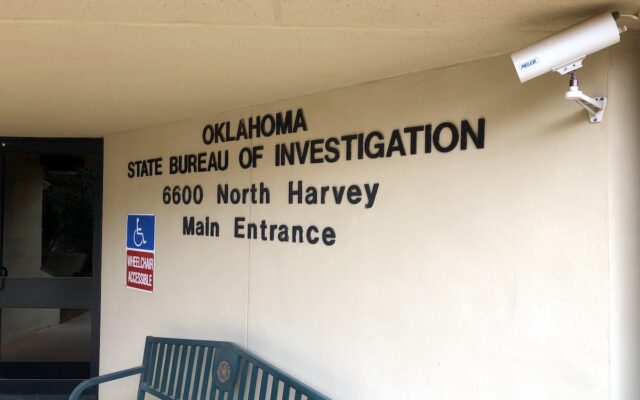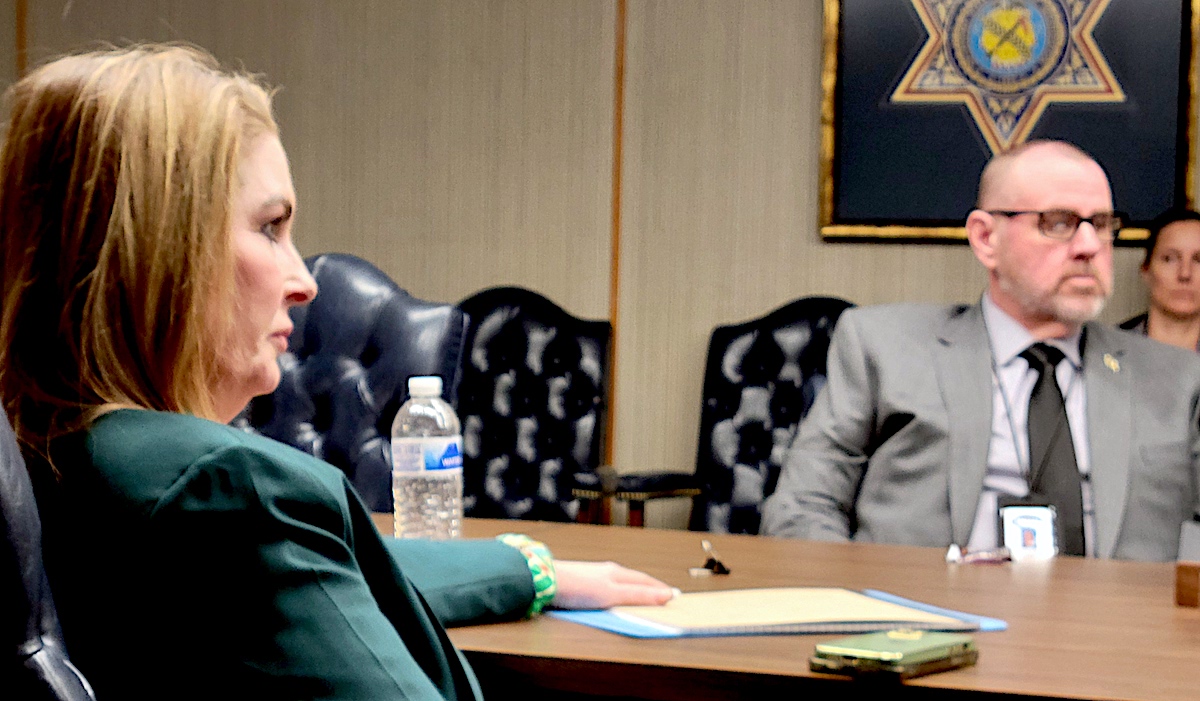
(Editor’s note: The following article includes reference to a racial slur.)
Kira Allen-Lowe’s 3 1/2-hour trip to speak with the Oklahoma State Bureau of Investigation Commission about how the agency is handling its probe into her mother’s slaying nearly 36 years ago proved to be for naught. She said she emailed the commission two months ago with a request to be heard at Wednesday’s meeting only to discover she was not on the agenda and was not allowed an opportunity to speak to the OSBI’s governing body.
“I assumed that they would have had my letter, and I would have been given an opportunity to voice my concerns,” said Allen-Lowe, of the Dallas area, whose mother, Mary Morgan Pewitt, was murdered in June 1988. “I was stunned.”
Commissioners were in for a surprise themselves during the meeting when Thomas Schneider, deputy general counsel to Attorney General Gentner Drummond, advised that two of three items listed on their agenda for executive session discussion were too vague to comply with Oklahoma’s Open Meetings Act.
Commissioners did go into executive session to discuss pending OSBI investigations. They returned about 10 minutes later and reported taking no action. Before adjourning the meeting, however, a pair of commissioners grumbled that another of the commissioners had called the Attorney General’s Office and requested an assistant to attend the meeting.
“If we have a commission member that has seen a problem or thought there was a problem with the AG’s Office, it should have been brought to our attention prior to this meeting so the agenda could have been corrected and reposted instead of people coming to this meeting today and no action being taken and nothing being done,” Chairman Vic Regalado said.
RELATED
As OSBI Commission gets AG report on director, general counsel resigns for racial slur in email by Tres Savage
Commissioner Angela Marsee, the district attorney for Beckham, Custer, Ellis, Roger Mills and Washita counties, said she called the AG’s office because of this month’s unexpected resignation of the agency’s new general counsel, Jana Wallace.
“That request was made because we don’t have a general counsel,” Marsee said. “It had nothing to do with the agenda.”
Commissioner Tim Turner, a former sheriff of Haskell County who is running for Oklahoma House District 15, said he was disappointed.
“My only issue is that we drive hours to get here for this meeting, and if we knew there was an issue (…) we could have postponed this meeting and set another date,” he said.
It marked the second time this year that at least one OSBI Commission member was irritated by driving to Oklahoma City for a special meeting that did not go as planned. In January, an OSBI Commission meeting that only featured an executive session about employment matters was canceled minutes before it began despite some commissioners driving into OKC during inclement weather.
Typically, the OSBI Commission meets quarterly. Regalado, the sheriff of Tulsa County, said the commission would not schedule a special meeting to take up issues that had been planned for discussion Wednesday. The next commission meeting is scheduled for Aug. 21.
“Hopefully, we can get to it at the next meeting and handle those issues accordingly,” Regalado said after the meeting.
Commissioners should have had plenty to talk about. In February, they heard complaints against executive director Aungela Spurlock from a former OSBI special agent and his wife over disciplinary actions that led to his retirement late last year.
The commission responded to former agent Joe Kimmons’ complaint by asking the Attorney General’s Office to investigate, and in an April 12 letter Drummond said Spurlock had committed no crime when the agency offered Kimmons a chance to avoid being fired if he received a doctor’s note and went on medical leave until his desired retirement date.
Among other issues faced by the commission are conflict of interest allegations against former OSBI counsel Richard Smothermon and questions about whether Spurlock or OSBI executives knew of a 2022 email Wallace had sent containing a racial slur when she was hired late last year. Beyond that, the agency has been sued over an agent’s wreck on the Turner Turnpike, and part of the OSBI’s headquarter building has been decommissioned owing to a mold outbreak.
‘I should have been on the agenda’

Faced with a long drive back to Texas without any answers, Allen-Lowe said she cried as she left the OSBI building Wednesday. She told NonDoc that the email she sent March 23 to the OSBI Commission address listed on OSBI’s website instead was received by an assistant to Spurlock.
“The date that I sent it, I received a phone call from Aungela Spurlock that was very brief,” Allen-Lowe said. “She said pretty much that, why didn’t I come to her with my concerns, and we’d like to get this straightened out, I’ll have my assistant set up some time where we can sit down and chat.”
Allen-Lowe said she eventually met with Spurlock on April 11, but she was unsatisfied with their conversation and chose to attend Wednesday’s meeting to complain to commissioners.
“I should have been on the agenda because I did send it to the OSBI Commission, and I was stunned that I didn’t get an opportunity to address my concerns,” Allen-Lowe said. “So as I was leaving, I spoke with somebody and I said, ‘You know, is it just the executive board that gets an opportunity to speak?’ and she said, ‘Yes ma’am,’ and I said, ‘Well I wrote a letter, you know, did they not receive it?’
“Well, she went and spoke with Aungela’s assistant, and she came over and spoke to me, and she said, ‘Well, no, you didn’t send that to the commission.’ And I said, ‘Yes ma’am, I did, here’s the email,’ and she said, ‘Well, you know, what’s on the agenda is what’s on the agenda.’ And I said, ‘So are you telling me that my mom’s case and this complaint doesn’t matter?’ And she said, ‘That’s not what I’m saying,’ and she walked off.”
Allen-Lowe said she did not get a chance to talk with Spurlock or Regalado before or after Wednesday’s meeting.
“I cried in the elevator going downstairs because it was another slap in the face [that] my case doesn’t matter,” she said.
‘It was like being that abandoned 8-year-old kid all over again’
Allen-Lowe was 7 years old when her mother was killed June 4, 1988 in Comanche, a small town south of Duncan. She and her younger sister had spent the night at their grandmother’s house while their mother worked at a bar in Comanche. They returned home the next morning to find their mother had been stabbed to death.
“Me and my sister found my mother, with my grandma,” said Allen-Lowe, who maintains a Facebook page about her mother’s case. “She was in her home, she was half nude, stabbed over 30 times. Yeah, we saw all of that from the window.”
The OSBI took over the investigation about 27 years ago, she said.
“They didn’t have it for the first nine years,” Allen-Lowe said. “And that’s kind of — there are always excuses that if they had it from the beginning (things would be different).”
Since 2014, five different OSBI agents have worked the case. Kimmons, the former special agent who filed complaints alleging that Spurlock targeted him for termination, worked the case for two years. Allen-Lowe said Kimmons kept her up to date and was trying to obtain grand jury transcripts last fall.
But Kimmons retired Dec. 11 after rejecting an unusual proposal that would have allowed him to take four months of medical leave and achieve a retirement date bearing additional state pension benefits. Kimmons had been suspended after using the phrase “my n—a” when answering an October phone call from a coworker and friend. Another OSBI employee overheard him and reported it. Kimmons and his wife filed complaints against Spurlock, alleging that her efforts to terminate him exceeded the discipline prescribed by OSBI policy. When Kimmons chose to retire instead of withdrawing his complaint, the OSBI Commission asked the Attorney General’s Office to investigate.
As Kimmons’ saga unfolded, Allen-Lowe sent him messages that went unreturned, and she drove to a meeting with District Attorney Jason Hicks. Eventually, on Jan. 8, Hicks told her that Kimmons was no longer with the OSBI.
“I was frustrated that the one person I had come to trust and believe in was no longer at the OSBI,” Allen-Lowe wrote in the letter she emailed to the OSBI Commission. “I contacted one of the OSBI victim support services; I thought she could bring me up to speed. Instead, I left a voicemail on [Jan. 8] at 2:58 p.m. and never received a callback. It was like being that abandoned 8-year-old kid all over again, knowing my mother was dead, but who was going to help me get the bad guy(s)?”
Allen-Lowe said she was irritated to learn that no agent had been assigned the case for four months.
“My complaint is that I shouldn’t have found out from my district attorney,” Allen-Lowe said Wednesday. “For months, I had no clue. I was sending Kimmons messages on his, you know, OSBI cell phone.”
Allen-Lowe said that’s why she emailed the OSBI Commission to voice her dissatisfaction with how her mother’s case had been handled.
“My complaint is how the OSBI chain of command has handled this case or lack thereof. The OSBI as a whole did not communicate with our family about any ongoing transition or even that a transition had occurred,” Allen-Lowe wrote in the March 23 letter. “This experience has left me deeply concerned about the victims’ families; your lack of genuine care and concern is disheartening. However, I understand that issues can arise, but at this point, I am on my fourth OSBI agent in less than 10 years. The first two agents may have exchanged two emails with me.”
On Wednesday, Allen-Lowe described her April 11 meeting with Spurlock and OSBI deputy directors.
“My issues were that pretty much every time you ask a question, there’s no answer,” Allen-Lowe said. “It’s just followed up with da-da-da-da-da, there’s no true answer. I know there was evidence lost in my mother’s case, I know that 100 percent.
“They knew we were coming. They should have been prepared to answer those questions.”
Hunter McKee, public information officer for OSBI, said Allen-Lowe’s letter was “received directly by the commission, and director Spurlock was aware of the letter.”
“Our team did meet with Ms. Lowe prior to today’s meeting to personally address any of her concerns,” McKee said in an email late Wednesday. “That interaction was not held in lieu of any meeting or discussion Mrs. Lowe would like to have with our commission. Due to the issues discussed in open session of our meeting this morning, we were not able to discuss that specific item or others that we intended to address today. However, we are working with the commission and others to allow discussion of all appropriate topics at future meetings.”
Agenda items failed to identify purposes of executive session

About 30 minutes into Wednesday’s meeting, commissioners attempted to go into executive session.
That’s when Schneider told commissioners that two of the items listed on the agenda to be discussed in executive session were too vague.
One item said commissioners were to “discuss the employment, hiring, appointment, promotion, salary, demotion, discipling or resignation of any individual salaried public officer or employee.” The other item said commissioners were to discuss “matters where disclosure of information would violate confidentiality requirements of state or federal law.”
Schneider said both violated the intent of the Open Meetings Act, and he referenced a 1997 attorney general’s opinion, which stated that agenda items for an executive session should identify the matters of business and purposes of the executive session.
Marsee defended her decision to ask the Attorney General’s Office for assistance in the wake of Wallace’s May 2 resignation as general counsel.
“It’s always important to have a general counsel who can lead the agency through any type of issues that we’re dealing with,” Marsee said after the meeting. “The Attorney General’s Office is routinely tasked in assisting agencies with that, and so that’s why I made that request.”
Regalado asked Marsee and other commissioners to give more notice if they have concerns.
“It completely derailed our discussions that were going to take place,” he said during the meeting.
Spurlock said the OSBI has two attorneys on staff who are able to handle legal matters for the commission.
“I think we’re absolutely capable of having our own legal representation for purposes of managing executive session,” Spurlock told commissioners. “I think we can provide the legal staff for the meeting.”
But Marsee said she preferred that the commission have its own legal counsel, a best practice that ensures a governing board and an agency director can each have their own attorney.
“We need to make sure that we’re not relying just on the lawyers on the board, that we have our own counsel, and that is why I was looking to the AG’s office for,” Marsee said.
If the OSBI Commission meets in August, two new commissioners could be at the table, pending State Senate confirmation hearings this month.
As the member representing police chiefs, Joe Prentice resigned from the commission earlier this year after he retired as chief of police in Okmulgee. Gov. Kevin Stitt has appointed The Village Police Chief Russ Landon to replace Prentice, although Landon has not seen his nomination approved by the Senate, and he sat along the wall with other observers at Wednesday’s meeting.
Former University of Central Oklahoma President Roger Webb is also being replaced after serving 11 years on the commission. Webb was not in attendance Wednesday, and neither was his replacement, construction company executive Jeffery VanHoose, whose term would begin July 2 if he is confirmed by the Senate.
OSBI Commission members are appointed by the governor to seven-year terms.
Read Kira Allen-Lowe’s full email to the OSBI Commission
(Correction: This article was updated at 10:10 p.m. Wednesday, May 15, to correct reference to Tim Turner’s title.)






















